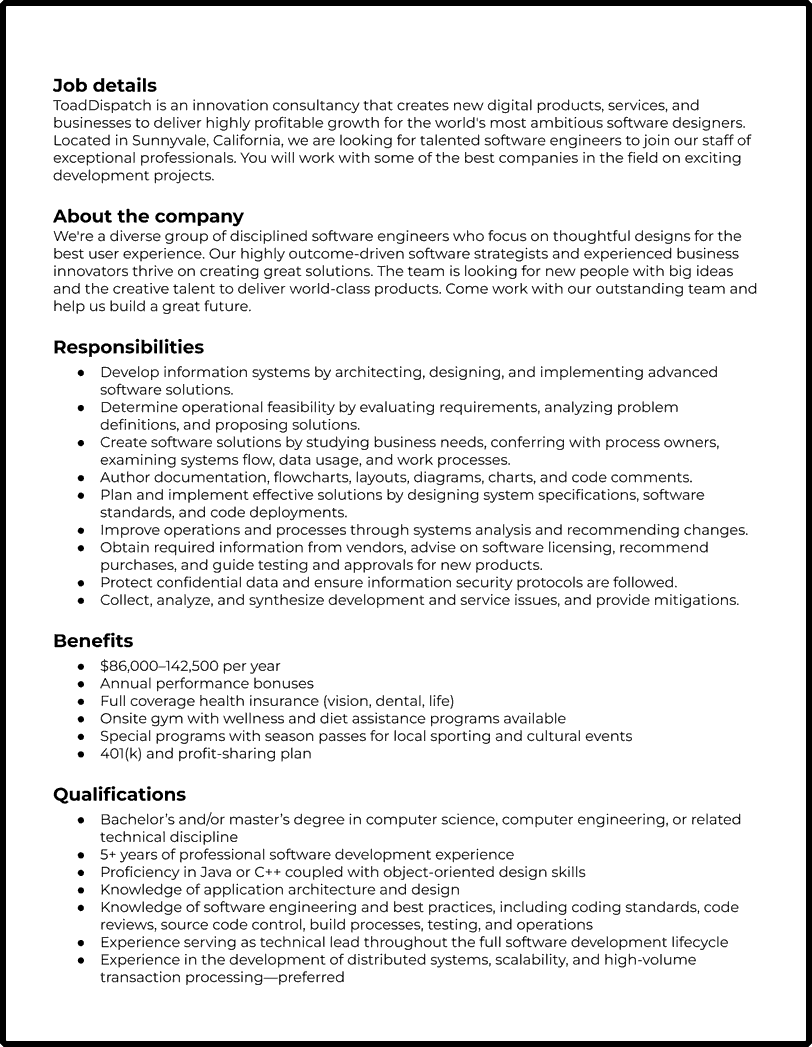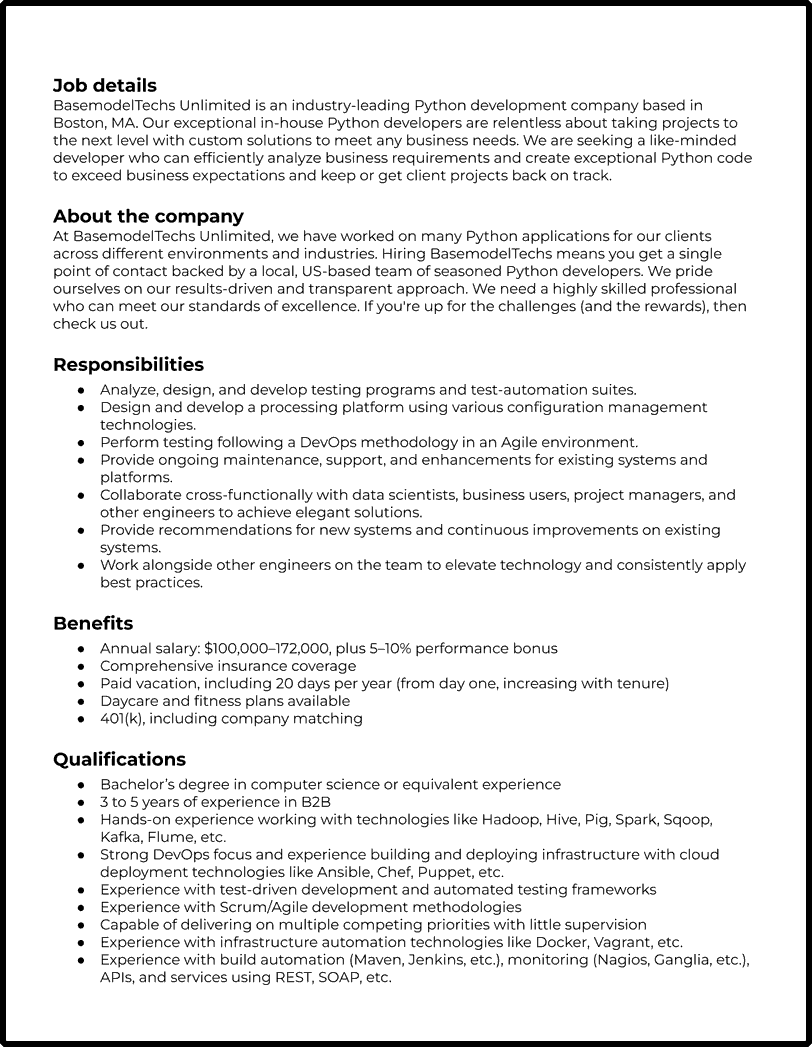A software engineering job description should include educational requirements (e.g. a bachelor’s degree in software, math, or science) and industry programming expertise in computer systems and applications such as Python, C++, or Java. The specifics will depend on the technologies involved, the company’s business focus, and the scope of the role. Employers also want candidates with strategic problem-solving abilities, analytical expertise, teamwork, and in some instances, leadership qualities, adaptability, innovation, communication, and a passion for learning.
Finding a great software engineer requires some effort. However, with our quality examples and guide, BeamJobs can help you craft an outstanding job description that will rake in some high-quality software engineer cover letters and resumes.
Why this resume works
- Your software engineer job description will need to be unique to your individual organization and the job at hand. Immediately stating what niche you’re hiring for will help sort through the vast array of specializations in the software engineering field.
- Include precise certifications, objectives, and coding languages that you need so that people know if they qualify.
- Speaking of being specific, make sure you explain whether you need a software engineer for systems software development or general software development.
- Ensure that no one gets their wires crossed by providing some applicable, real-world examples and context for the job.
Why this resume works
- What is the core reason you’re writing a Python software engineer job description to begin with? Clarify the point of the job as soon as possible.
- As much as you want to talk at length about your company, avoid the temptation to information dump right at the beginning.
- You’ll already share a rudimentary understanding of job expectations associated with Python software engineering. But for ideal results, list specific uses for each programming skill in your job requirements section.
- Don’t forget to specify applicable soft skills as well—even the most technically capable applicant might not be a good fit for the role!
Why this resume works
- Senior roles pack a lot of punch, and you’ll have to convey tons of information in your bullet point requirements.
- Using active language can speak volumes, so use dynamic terms like “guide,” “create,” “lead,” and “oversee.”
- Sometimes you simply can’t shorten requirements lists any further, and that’s okay. It’s important not to leave out key qualifications–just stay as concise as possible.
- Using a brief “about” section at the end of your senior software engineer job description provides even better insight regarding your business’ goals.
- Display your company culture by describing what your current teams and work environment are like so that candidates know what they’re up for while customizing their resumes.
How to Write a Software Engineer Job Description
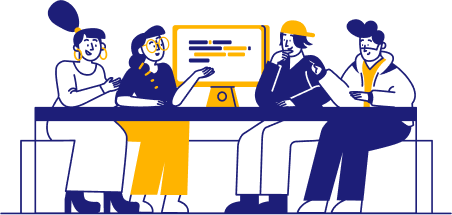
Writing, in general, is a tricky business. Potential candidates struggle to write compelling software engineer resumes, but you can make their job easier by writing a succinct and clear job description. If the reader cannot get a good understanding of what the job and/or your company is about, they’ll lose interest and look at the next job listing.
So, do use clarity. Don’t use generic or vague descriptions. Use examples to show what types of problems the job is required to solve. Focus on what is unique about the job versus a typical software engineering role. If your culture is great, then talk about team dynamics or company perks that unite the crew.
One of the most essential rules to remember when writing a job description is to keep it brief. Job seekers won’t read excessively long or boring job descriptions. Snag their attention and keep it to communicate all the salient information about the job. Includes anything explaining how your position is special, but keep the overall description as short as possible.
Avoid listing generic skills or using filler words. For concise business writing, it’s imperative to drop habitual roundabout phrases. Need a developer who has the ability to create exceptional Python code? Or a developer who can create exceptional Python code? Do some sleuth work, and replace wordy phrases with a single word; it’ll make a difference in readability.
When writing the qualifications, be specific and succinct while reflecting the values and qualities you want to see in your software engineers. You do want to include some common positive traits and characteristics of great software engineers, like a willingness to learn, interpersonal and team communication skills, and being adaptable and flexible. If you’re struggling to keep your qualifications list short, weave these into the responsibilities section. For example, using the words “partner” or “collaborate” reflects the required interpersonal and communication skills.
Keep in mind, though, that having a giant list of qualifications or having qualifications that are difficult to understand is a sure way to get your job description passed over. Too many requirements are also known to discourage diverse candidates. Keep the list as short as possible without leaving out anything that is a deal-breaker.
We get it. It’s challenging to clearly describe a software engineering job without getting too wordy. If this is happening, step back and remember why you’re hiring for the role in the first place. What problem are you trying to solve by filling this job? Are you a startup hoping to transform the finance sector with machine learning? Will this be a customer-facing role designed to deliver technical solutions that will scale growth? Whatever your reason, use it to explain the position; it will make for a much more compelling job description.
Lastly, avoid the temptation to post your job description immediately. Let your brain and eyes rest for a day or so before you come back to it. Revising is often the last thing we want to do, but it’s one of the most important.
Grammatical, spelling, and/or gross formatting mistakes, not to mention unclear sentences or confusing or contradictory requirements, will certainly disenchant potential software engineers. Invite people on your team to take a look; then, give it another check yourself before publishing.
The Outline for Your Software Engineer Job Description
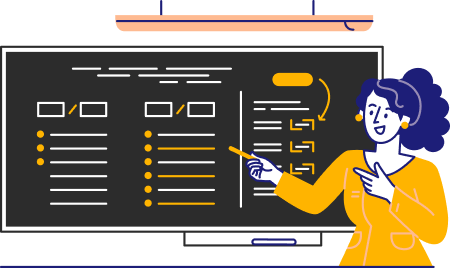
Frequently, the best way to start your software engineer job description is by making an outline. If you’re having trouble coming up with a plan, try copying the items below to give you structure and a place to begin. Next, just fill in the details, leveraging the guidance we’ve provided for each section.

Job details
Introduce your job with a very brief overview of the position and company. This is your one opportunity to grab the reader’s attention. Focus on anything especially cool or exciting about the job or company. A software engineer is a well-established job title, and you don’t need to explain that in detail here. The following section will cover this. Keep your attention on making your job description unique and compelling to entice the best applicants for this role.

About the company
You should place this as the last section of your job description. This is your final opportunity to make an impression on the reader. A software engineering professional is going to be interested in the technology and software programs your company uses. Include some highlights, and discuss anything unique or cutting edge.

What you’ll be doing
This section should be a bulleted list of the crucial tasks a software engineer will need to perform while working for your company. Each line should be a brief and clear description of the roles/responsibilities. Avoid generic and/or basic tasks that would apply to just about any role. Do include anything atypical or that comprises a majority of the software engineering role. The best practice for a good job description is to start each line with a specific and active verb. Avoid too much jargon, acronyms, and filler words.
- Develop information systems by architecting, designing, and implementing advanced software solutions.
- Create software by studying business needs, conferring with process owners, and examining systems flow, data usage, and work processes.
- Author documentation, flowcharts, layouts, diagrams, charts, code comments, and clear code for solutions development.

Qualifications
Your qualifications section should always include education, prior experience, certifications, and any specific technical skills you expect candidates for your software engineering position to have. Be detailed but clear, so job seekers can quickly ascertain whether they’re a good fit for the position. Include any specifics your organization requires that may not be something a software engineer working for another company would have or know.
A software engineer will have a lot of highly technical skills. It’s not necessary to list every single technical or hard skill, so list the ones crucial and most important for the role. Any engineer is expected to be analytical and detail-oriented, so avoid listing too many soft skills as you’ll run the risk of candidates skipping over the requirements you care about most. Every job description section must be brief, specific, and clear—this area is no exception.
- Bachelor’s and/or master’s degree in computer science, computer engineering, or related technical discipline
- 5+ years of professional software development experience
- Proficiency in Java or C++

Benefits
You can place this section just about anywhere in your job description, but you probably don’t want it as the introduction. Your benefits section should be a simple list of bulleted items. Typical items to include for a software engineer are annual salary, bonus, insurance coverage, vacation, 401(k), and any other compensation or retirement benefits.
Be thorough as candidates are very much interested in knowing these details, but keep it concise. If your software engineering position or organization has something special you provide to employees, such as an onsite gym, then say so. You want to make the position as attractive as possible.
Various Roles and Responsibilities of a Software Engineer
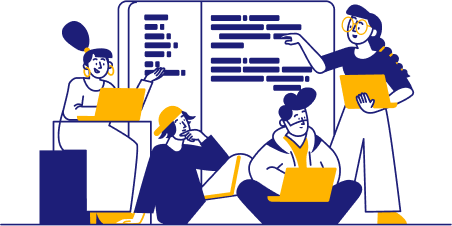
Software engineers can play many roles within a company. They are entrenched in IT, but good engineers are also valuable process owners, and in the case of highly skilled communicators, they can be client-facing analysts or even sales support. A single software engineer may not perform all the following roles, but this list, which is typical to see in job listings, will help you fill in the outline above.

Development
- A software engineer is a key resource responsible for designing and developing software applications and systems.
- Create software models, simulations, and testing scenarios, and execute quality assurance.
- Use applications, tools, and other resources to create programming code and manage all versions of code.
- Drive development activities throughout the full software development lifecycle.

Analysis
- Data and systems analysis is another crucial function that software engineers perform. Their expertise with the software and technical processes gives them the knowledge needed to thoroughly assess performance and find issues.
- Perform requirements analysis (business and technical) to define software and code necessary to accomplish objectives.
- Facilitate the analysis of utility and warranty for software and systems.
- Provide ongoing analysis to identify opportunities for improvements.

Maintenance
- Software engineers are also typically engaged for ongoing support and change management of software and systems.
- Monitor performance and availability of applications, and resolve technical issues with code.
- Perform maintenance activities and software updates for existing systems.
- Ensure that software complies with security, audit, and other industry standards.
- Train and mentor junior software engineering staff or project resources.

Innovation
- A software engineer must be creative and resourceful. Creating efficient software code requires more than just skill; it also requires imagination and vision.
- Research and identify new technologies as well as make recommendations for new and upgraded systems.
- Stay up to date on the latest technologies, software versions, and solutions related to all relevant systems and business processes.

Planning and project management
- Software and systems development requires a very high level of organization, and project management is leveraged heavily to keep activities on track.
- Translate business requirements to technical specifics, and develop architecture and design based on client or company objectives.
- Assist project managers with level-of-effort estimates and scheduling.
- Develop and execute plans for projects, tasks, and changes.




